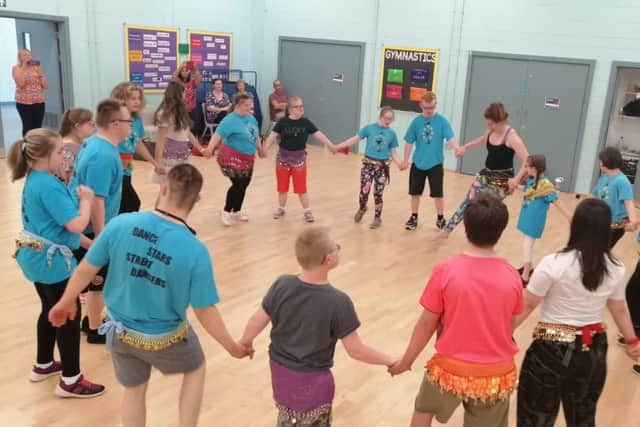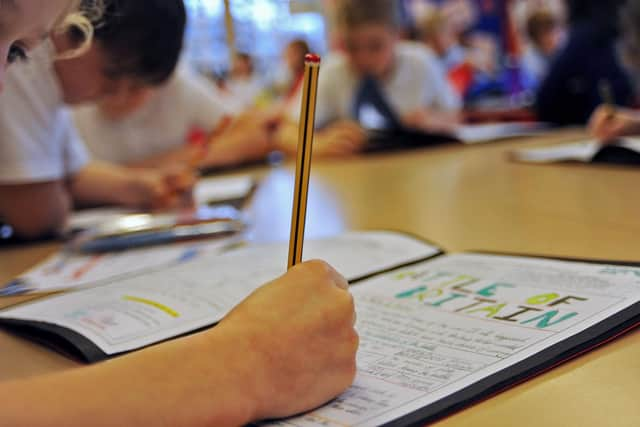Sheffield reporter tells how being dyslexic does not mean you are 'stupid'
and live on Freeview channel 276
As Dyslexia Week approaches – which runs from October 5 to 11 – there is no better time to raise awareness and put rumours straight.
As well as being labelled ‘stupid’, another assumption is that people are only diagnosed at primary school age but it seems the number of people being diagnosed as adults is increasing.
Advertisement
Hide AdAdvertisement
Hide AdI write for a living and I was confirmed as having dyslexic traits only this year - in my 20s.


Knowing this has helped me understand why I struggle with certain things and has also made me want to raise awareness about the misconceptions of being dyslexic.
Although I’ve been a journalist for just over a year, unbeknown to a lot of people, it’s the hardest job I’ve ever had.
I’ve sort of learnt to adapt, but at the beginning I panicked at the thought of turning around a certain amount of stories each day and learning shorthand filled me with dread.
Advertisement
Hide AdAdvertisement
Hide AdI’d always had difficulties at school, particularly in English lessons.


I couldn’t keep up with the class whenever we studied a book together - I basically made up what happened in Harry Potter because I hadn’t a clue what was going on.
I hated reading aloud and if I could get away with it, I’d skip lines to get it be over with faster.
I didn’t put my hand up to answer questions in classes because I never had enough time to process what was actually being asked, but this just led to me always being picked on.
Advertisement
Hide AdAdvertisement
Hide AdThis culture of pressuring children to do things they don’t want to is only a hindrance to their learning in my opinion.


As I always ‘did okay’ in terms of grades, nothing was ever challenged.
I didn’t know I could be classed as having special educational needs so why would I question it - it was just a struggle that I thought I would have to put up with.
Fast forward several years and I failed my first journalism exam. I thought that was a sign that I couldn’t do this job. On the other hand, I really loved meeting the wonderful people I was writing about and making a difference in society.
Advertisement
Hide AdAdvertisement
Hide AdI’d had discussions with a friend, also in her 20s, who was diagnosed with dyslexia just a few years before and everything she described seemed to resonate with me.


I began to do more research and discovered that there were other traits of dyslexia that matched with me, for example, not being good with directions.
After an assessment confirmed I do have dyslexic traits, I was able to get exam adjustments including extra time.
I am certain that I wouldn’t have passed my journalism exams without that in place.
Advertisement
Hide AdAdvertisement
Hide AdNow I think back to the times at school and wonder if only I had that extra support, maybe I wouldn’t have found school such a daunting experience.
People always say, ‘you can’t be dyslexic because you did well at school and you’re a journalist’.
It’s true that I write everyday but it doesn’t mean that it isn’t a struggle everyday too.
I look around the newsroom and my colleagues churn out story after story as if they don’t even have to think about it. I almost feel jealous that they can do that.
Advertisement
Hide AdAdvertisement
Hide AdI, however, need that extra time to process information before I start writing.
I think there is that assumption that dyslexic people are ‘stupid’, that they are bad at reading and writing but there is a whole lot more to it.
I can read and write but I am a bit slower than the average person and I struggle with spelling sometimes but not all the time. Ironically, I always have to think how to spell ‘dyslexic’!
Eleanor Gaywood is in her 20s too and similarly didn’t know she was dyslexic until university, where she studied Zoo Biology.
Advertisement
Hide AdAdvertisement
Hide AdShe is one of many creative people who are dyslexic and research continues to argue that there may be a link between the two.
Eleanor struggles to communicate what she is thinking but she realised that dance was one thing that helped her express herself and seeks to help others do the same.
She struggled at school too, particularly with coursework and it was assumed that she may have just been ‘lazy’.
Eleanor said: “There was no way around it. I still achieved things. I got all my grades.”
Advertisement
Hide AdAdvertisement
Hide AdIt was not until university that someone had made the suggestion of her possibly being dyslexic.
An in depth assessment confirmed that Eleanor was dyslexic and because of this she was able to get the help and support she needed.
She said: “It was one of the best things for my confidence. I thought I was just dippy, not as clever.”
It is a common misconception that dyslexic individuals are not as intelligent but Eleanor’s assessment proved this wrong, as it was found that she was in the top four per cent for IQ.
Advertisement
Hide AdAdvertisement
Hide AdShe added: “It’s frustrating. Dyslexia is not just reading and writing.”
Since her diagnosis, Eleanor believes she has been able to achieve more things and has come to realise that she is not ‘just stupid’.
For more information, see: https://www.bdadyslexia.org.uk